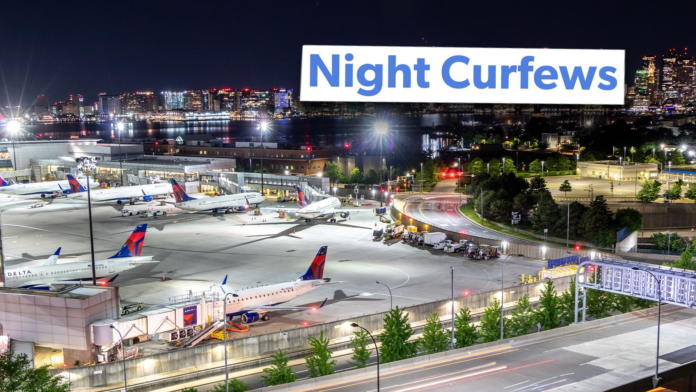Airports are often bustling with activity at all hours, What Are Airport Curfews And Why Do They Matter? Many US airports enforce these curfews to limit noise pollution, minimize disruptions, and maintain harmony with surrounding neighborhoods. Here’s a detailed look into night curfews, why they’re implemented, how they affect airlines, and which airports have the strictest policies.
What are night curfews at airports?
Night curfews at airports are time restrictions during which aircraft operations are limited or prohibited to minimize noise disruptions for nearby residents.
Curfews typically restrict flights during nighttime, generally between 10 PM and 7 AM, but these times vary. Only specific types of flights or aircraft may operate during curfew hours, usually for essential or emergency purposes.
Photo: Worapot Boonyakate | Shutterstock
Curfews aim to balance airport operations with the well-being of surrounding communities, particularly in densely populated areas. According to Naples Airport, which enforces one of the strictest curfews in the US, these measures are critical to maintaining community support and meeting noise abatement objectives.
Worldwide airports with strict curfews:
Airport Name Location Curfew Hours (Local Time) Notes Sydney Kingsford Smith Airport (SYD) Sydney, Australia 11:00 PM – 6:00 AM Strict curfew with limited exceptions for emergency situations. Frankfurt Airport (FRA) Frankfurt, Germany 11:00 PM – 5:00 AM Night flight ban with specific exemptions for delayed flights. Zurich Airport (ZRH) Zurich, Switzerland 11:30 PM – 6:00 AM Enforces night curfew to balance operations with community concerns. London Heathrow Airport (LHR) London, UK 11:30 PM – 6:00 AM Limits number of flights and noise levels during nighttime hours. Brisbane Airport (BNE) Brisbane, Australia 11:00 PM – 6:00 AM Night curfew with certain exemptions for essential services. Adelaide Airport (ADL) Adelaide, Australia 11:00 PM – 6:00 AM Maintains strict curfew to minimize noise impact on communities. Paris Orly Airport (ORY) Paris, France 11:30 PM – 6:00 AM Enforces night curfew with few exceptions for specific flights. Toronto Pearson Int’l Airport (YYZ) Toronto, Canada 12:30 AM – 6:30 AM Implements nighttime restrictions to manage noise.
Why are night curfews needed?
Night curfews exist primarily to reduce noise disturbances for people living near airports. Aircraft noise during the night can disrupt sleep, affect health, and reduce property values. Studies have shown that exposure to constant noise can lead to health issues such as stress, high blood pressure, and cardiovascular problems.
For the latest aviation news, follow Simple Flying!
In addition to health impacts, curfews help foster positive relations between airports and nearby communities. Noise abatement programs, such as those at Reagan National Airport, help airports manage noise complaints and ensure compliance with noise reduction measures.
Airports with strict curfews
Several US airports have strict curfews, including San Diego International Airport, Naples Municipal Airport, and Washington DC’s Reagan National Airport. Each has specific regulations and penalties for non-compliance.
Photo: Hananeko_Studio I Shutterstock
San Diego International Airport enforces a 10:30 PM to 6:30 AM curfew for departures and a midnight to 6 AM curfew for arrivals. According to one source, airlines face steep fines for violating this curfew, with JetBlue and American Airlines among the top offenders.
Naples Municipal Airport also enforces strict noise abatement procedures. The airport limits aircraft operations between 10 PM and 7 AM. According to Naples Airport, these restrictions prevent excessive nighttime noise and maintain a peaceful environment for local residents.
Photo: Gorodenkoff | Shutterstock
Washington DC’s Reagan National Airport has implemented nighttime noise rules, though they do not have an official curfew. The airport encourages airlines to avoid scheduling flights between 10 PM and 7 AM to reduce noise impacts.
Reagan National Airport emphasizes voluntary compliance and noise monitoring, enabling airlines to adhere to its noise guidelines to mitigate community disruption.
Airports without curfews and their challenges
While some airports have strict curfews, others operate 24/7, including major hubs like Seattle-Tacoma International Airport (SEA).
According to SeatacNoise.info, SEA does not have a nighttime curfew despite rising concerns from nearby communities.
Photo: Nate Hovee | Shutterstock
Implementing a curfew is challenging for SEA due to federal regulations and the airport’s role as a critical transportation hub. Nighttime operations support cargo flights and transpacific routes, which are economically important for the region.
Airport Name Location Notable Noise Complaint Data Ronald Reagan Washington National Airport (DCA) Arlington, Virginia In 2015, DCA received 8,760 noise complaints, with 78% (6,852 complaints) coming from a single household. San Francisco International Airport (SFO) San Francisco, California Between 2014 and 2015, SFO received thousands of noise complaints, with a significant portion attributed to a small group of individuals. Denver International Airport (DEN) Denver, Colorado From 2014 to 2015, DEN was among the busiest airports, receiving thousands of noise complaints, often from a concentrated group of residents. Seattle-Tacoma International Airport (SEA) Seattle, Washington In 2015, SEA experienced a high concentration of noise complaints, with a small number of residents accounting for a large percentage of the total complaints. Minneapolis-Saint Paul International Airport (MSP) Minneapolis, Minnesota MSP reported a significant number of noise complaints, with data indicating a high concentration of complaints from specific individuals or households. San Diego International Airport (SAN) San Diego, California In 2022, SAN saw a significant increase in curfew violations, with 89 flights departing after the curfew, compared to 52 the previous year, leading to numerous noise complaints from residents. LaGuardia Airport (LGA) New York City, New York Residents of Queens, particularly in Bayside and Flushing, have been heavily impacted by the



